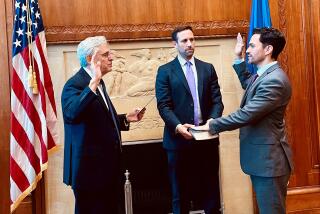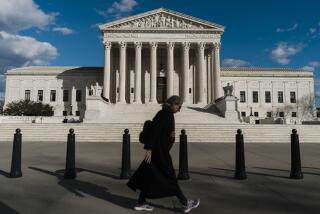Questioning Secrecy
- Share via
Atty. Gen. John Ashcroft and members of the Senate Judiciary Committee need to admit that they are on new and unsteady ground when they meet this week to discuss the sudden and sweeping erosion of liberties the Bush administration has proposed or implemented in its war against terrorism. The sorts of enemies who attacked the United States Sept. 11 and threaten to attack again are neither traditional criminals nor traditional warriors. That said, Congress must belatedly assert its authority and put the war against this dangerous new foe on a less reckless course, one that protects the nation without trampling the rights that make it worth defending.
Secret detentions, secret trials, wiretapping conversations between lawyers and clients, “invitations” to appear before government agents for questioning have become the hallmarks of Ashcroft’s tenure at the Justice Department--policies often imposed without public notice or congressional approval. This week senators should pepper him with questions, making him demonstrate that the security provided by each of these new policies is worth the accompanying encroachments on privacy, due process, free speech and other civil liberties.
Here are some questions senators should ask Ashcroft.
The U.S. convicted the 1993 World Trade Center bombers in federal court, so why have you proposed military tribunals for suspected terrorists now? Why limit defendants’ choice of attorney? Why let juries convict with a lower burden of proof than in regular criminal trials? Why no right of appeal?
Even the Uniform Code of Military Justice demands a public trial and a unanimous verdict for a death sentence--so why does the administration think it needs to hold these tribunals aboard warships at sea with possibly no members of the press or public in attendance and no information released other than the name of the defendant and his conviction? What is the national security risk of letting people watch the way their government conducts the affairs of those it represents? Does the administration think that the words of discredited hatemongers will prove more inspiring than fair and open judicial proceedings?
Of the more than 1,100 individuals arrested after Sept. 11, some 500 remain in custody, yet you have refused to release the most basic information about them. If this secrecy was really to keep from tipping off Osama bin Laden and to protect the detainees’ privacy, why did you last week open up limited information about 93 of the suspects? What about the others?
Prosecutors have always argued that they need tougher tools to protect society, that the accused have too many rights. If we still believe that one is innocent until proven guilty and that this basic tenet means every suspect has the same basic rights, how do you justify your decision to allow eavesdropping on conversations between attorneys and clients?
The United States has rushed to round up perceived enemies and conduct secret hearings before and then regretted it. The nation paid reparations to Japanese Americans who had been locked in camps during World War II and views the anti-communist excesses of the McCarthy era with embarrassment.
Last week Bush warned, “We must not let foreign enemies use the forums of liberty to destroy liberty itself.” Congress has a constitutional obligation to make sure that Ashcroft and the president do not undermine the very liberty they want to protect.
More to Read
Get the L.A. Times Politics newsletter
Deeply reported insights into legislation, politics and policy from Sacramento, Washington and beyond. In your inbox twice per week.
You may occasionally receive promotional content from the Los Angeles Times.










